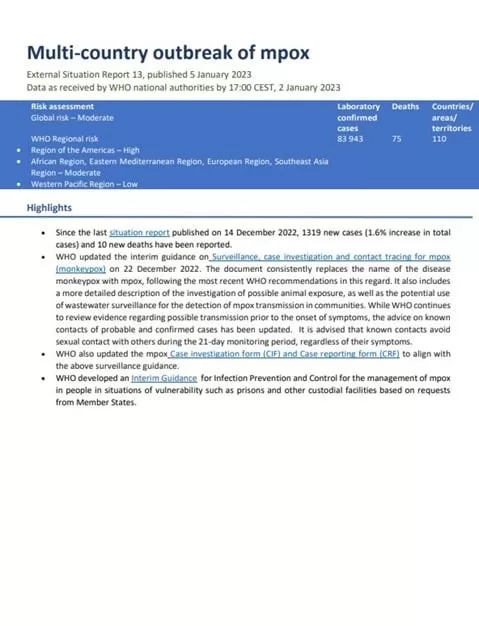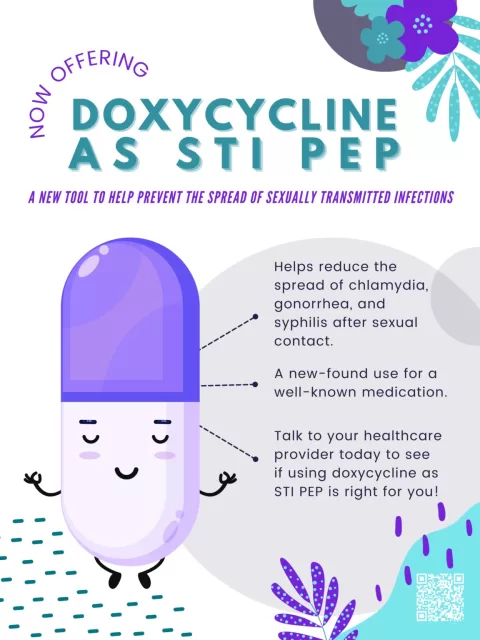The recent WHO mpox report highlights a critical public health emergency that demands immediate attention. Convened on August 14, the World Health Organization’s emergency committee unanimously labeled the ongoing mpox outbreak in Africa as a public health emergency of international concern (PHEIC). This alarming declaration sheds light on the need for aggressive containment measures and the facilitation of vaccines in affected regions, specifically targeting countries like the Democratic Republic of the Congo and Uganda. Furthermore, the report indicates an array of recommendations not only for mpox vaccinations but also underscores the significance of monitoring other emerging health threats, such as Eastern equine encephalitis and the Oropouche virus. As the FDA advances syphilis testing capabilities and public awareness around rising Salmonella outbreaks linked to pet turtles grows, it is essential for the global health community to remain vigilant and proactive in safeguarding public health.
The mpox situation has escalated into a significant global health concern, prompting the World Health Organization (WHO) to take decisive action. This outbreak, which primarily affects various regions in Africa, underscores the urgent need for comprehensive health responses, including vaccination efforts. The WHO’s assembly highlighted the role of other viral threats such as Eastern equine encephalitis and Oropouche virus in this evolving landscape of infectious diseases. Simultaneously, advancements like the FDA’s at-home syphilis test illustrate the ongoing progress in tackling sexually transmitted infections. As we navigate these complexities, it becomes increasingly crucial for communities and health authorities to enhance their preparedness and responsiveness to both known and emerging pathogens.
WHO Mpox Panel Report: A Global Health Warning
The recent WHO mpox panel report outlines urgent recommendations aimed at addressing the public health emergency triggered by the mpox outbreak in several African countries. The situation is particularly alarming in nations such as the Democratic Republic of the Congo, Burundi, and Uganda, where the rate of infection has surged. The committee emphasizes the importance of swift vaccination efforts, encouraging countries to set up immunization advisory groups. With the WHO’s directive, member states must act promptly to adopt these recommendations, as the global spread of the mpox virus poses a substantial threat to public health.
Given the potential for the mpox virus to cross borders and affect international populations, the WHO’s call to action is a critical component of global health initiatives. The need for coordinated responses, including surveillance and clinical management strategies, is paramount. Countries are advised to prepare their healthcare systems for possible outbreaks and ensure that vaccines are available to frontline workers. As part of these ongoing efforts, the WHO continues to advocate for increased funding and resources to combat the rising public health threats associated with emerging infectious diseases.
Frequently Asked Questions
What recent findings were discussed in the WHO mpox panel report?
The WHO mpox panel report, released on August 14, 2024, concluded that the mpox situation in Africa is a public health emergency of international concern (PHEIC). The report emphasizes the need for countries, especially those like the Democratic Republic of the Congo and Uganda, to prepare for mpox vaccinations as part of their emergency response efforts.
What is the connection between Eastern equine encephalitis and the WHO mpox panel report?
While the WHO mpox panel report primarily addresses the mpox virus, the recent emergence of Eastern equine encephalitis (EEE) cases highlights the ongoing challenges public health agencies face concerning mosquito-borne viruses, which can complicate responses like the one suggested by the WHO regarding mpox vaccinations.
How does the new FDA-approved at-home syphilis test relate to broader public health reports like the WHO mpox panel report?
The FDA’s recent approval of an at-home syphilis test reflects ongoing efforts to enhance public health measures against sexually transmitted infections (STIs), which complements the initiatives outlined in the WHO mpox panel report. Both emphasize the importance of accessible testing to control infectious diseases.
What precautions should travelers take considering the rising cases of Oropouche virus discussed in health reports?
Travelers should adhere to CDC guidelines, particularly pregnant women traveling to regions like Cuba where Oropouche virus cases have increased. Preventive measures include using insect repellent and practicing good hygiene to reduce the risk of transmission, paralleling recommendations from the WHO mpox panel report on immunizations.
How is the ongoing Salmonella outbreak linked to pet turtles affecting public health related to mpox?
The Salmonella outbreak highlights the importance of monitoring animal-related transmission risks, similar to how the WHO mpox panel report emphasizes preventing the spread of infections. Public health responses require vigilance against various zoonotic diseases, including mpox and those associated with animals like turtles.
| Topic | Key Points |
|---|---|
| Mpox | WHO declared PHEIC for mpox in Africa; recommends vaccinations and emergency response preparation. |
| Eastern Equine Encephalitis (EEE) | First cases reported in Massachusetts and Vermont since 2020 and 2012, respectively; EEE can cause severe neurological illness. |
| At-home Syphilis Test | FDA approved a new at-home test for syphilis; cases of syphilis in the US are rising. |
| Adjuvanted Flu Vaccine | MF59-adjuvanted flu vaccine shown to be more effective than high-dose version in older adults with risk factors. |
| Negative Memories of COVID-19 Lockdowns | Memories of COVID lockdowns have less emotional detail over time, but children’s mental health is declining. |
| Oropouche Virus | CDC alerts for Oropouche virus due to increased activity in Cuba; pregnant women are particularly at risk. |
| Salmonella Outbreak | CDC reports Salmonella outbreak linked to pet turtles, affecting 51 across 21 states. |
Summary
The latest mpox report highlights critical public health concerns, particularly regarding mpox’s classification as a public health emergency of international concern by the WHO. This situation necessitates immediate action, including vaccination efforts and emergency preparedness in countries affected by mpox, especially in Africa. Additionally, the rising reports of Eastern Equine Encephalitis and salmonella outbreaks linked to pet turtles are alarming reminders of the ongoing health challenges. The FDA’s recent approval of an at-home syphilis test reflects the urgent need to address rising sexually transmitted infections in the U.S. Overall, these developments underscore the importance of proactive health measures and public awareness in combating infectious diseases.
The content provided on this blog (e.g., symptom descriptions, health tips, or general advice) is for informational purposes only and is not a substitute for professional medical advice, diagnosis, or treatment. Always seek the guidance of your physician or other qualified healthcare provider with any questions you may have regarding a medical condition. Never disregard professional medical advice or delay seeking it because of something you have read on this website. If you believe you may have a medical emergency, call your doctor or emergency services immediately. Reliance on any information provided by this blog is solely at your own risk.








